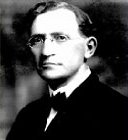In the early decades of the last century, an epidemic plagued the South, striking one in five Southerners.* Pellagra, also known as 3D disease, proceeded from dermatitis, to diarrhea, to dementia. Actually there were four Ds associated with Pellagra, because it often led to death. Known in Europe since the late eighteenth century, Pellagra was not identified in the United States until Atlanta doctor H.F.Harris diagnosed it in a young farmer. Pellagra outbreaks in Europe generally happened in peasants whose diets consisted mostly of corn (maize). It was always assumed that something in the corn caused it. Many assumed that the poor contracted it because they were not fastidious enough in their personal hygiene and food preparation.
 In 1914 Surgeon General Rupert Blue (a South Carolina native) appointed U. S. Public Health Service super-sleuth Dr. Joseph Goldberger to head a commission charged with identifying the cause and cure of Pellagra. A tireless and meticulous researcher, Goldberger soon found that people developed Pellagra not because of what they ate, but because of what they didn’t eat. He went to prisons and orphanages whose inmates were generally fed a steady diet of corn-pone, molasses, and salted pork, and replaced that fare with cheese, red meat, beans, fresh vegetables, and milk. In short order those with Pellagra got better, and outbreaks stopped. Goldberger was never able to identify the specific missing element he was introducing into the diet of those at risk, but he knew nothing in corn caused Pellagra. It was caused by a deficiency.
In 1914 Surgeon General Rupert Blue (a South Carolina native) appointed U. S. Public Health Service super-sleuth Dr. Joseph Goldberger to head a commission charged with identifying the cause and cure of Pellagra. A tireless and meticulous researcher, Goldberger soon found that people developed Pellagra not because of what they ate, but because of what they didn’t eat. He went to prisons and orphanages whose inmates were generally fed a steady diet of corn-pone, molasses, and salted pork, and replaced that fare with cheese, red meat, beans, fresh vegetables, and milk. In short order those with Pellagra got better, and outbreaks stopped. Goldberger was never able to identify the specific missing element he was introducing into the diet of those at risk, but he knew nothing in corn caused Pellagra. It was caused by a deficiency.In 1937, eight years after Goldberger’s death, University of Wisconsin Doctor, Conrad Elvehjem discovered that Pellagra is caused by a niacin deficiency. Corn happens to increase the body’s need for niacin, but does not directly cause the disease. Now that breakfast cereals and multi-vitamins are enriched with niacin, Pellagra is virtually unknown in America.

When groups of people are out of harmony with each other; when a body-politic or a church body finds itself plagued with poor internal health, the cause is usually identified as some outside force added to the mix. We’ve become too prosperous, too distracted, too consumed by outside responsibilities, too modern, too reactionary, too crowded, too isolated, too busy, too bored. Maybe it’s the new guy’s fault we don’t get along, or the new technology, or new demands putting new stresses on old, fragile fault lines.
Disharmony, disunity, and discord are not caused by what we have, but by what we lack, by a deficiency.
When the Apostle Paul wrote the first Corinthian letter he was writing to a very sick church. It was a church plagued with law suits between brethren, drunkenness at the communion table, worship services that looked like cage matches, and sexual promiscuity. They were continually arguing about whose baptism was better, and whose spiritual gift was better. Paul could have rolled up his sleeves and put on his social worker’s cap and got down to the business of identifying the psychological and societal causes of their poor organizational health.
He could have, but he didn’t. He says the issue is not the baggage they have brought to the table, but what they have failed to bring to it. After discussing the comparative merits and proper uses of spiritual gifts, he ends chapter twelve with this teaser: But earnestly desire better gifts.” He certainly has their attention. What are these better gifts? He tells them.
If I speak in languages of men and angels, and have not love, I am a banging gong and a clanging cymbal. If I have the gift of prophecy and can fathom all knowledge, and if I have faith that can move mountains, but have not love, I am nothing. If I give all I possess to feed the poor and surrender my body to be burned, but have no love, I gain nothing. I Corinthians 3.1-3.
“My diagnosis,” Dr. Paul says, “is that you are plagued not by what you have, but by what you don’t, and what you don’t have is love.” God is love. Love sums up the law and the prophets. Love is the debt we owe every person. Love is the meaning of the cross. Love is everything that is anything healthy and eternal.
Love is the only thing that makes us better, because not having it is what makes us sick in the first place.
From the Archives: Friday, 28 October 2005
* “The Forgotten Plague,” by Daniel Akst, in American Heritage, December 2000, pp 73-79.

